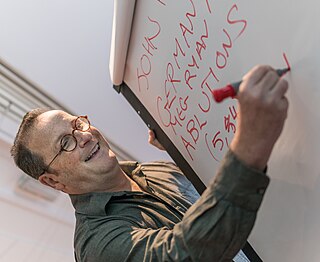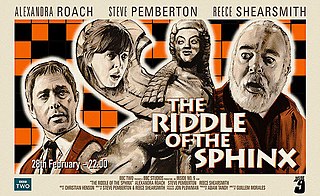Related Research Articles

A crossword is a word puzzle that usually takes the form of a square or a rectangular grid of white- and black-shaded squares. The goal is to fill the white squares with letters, forming words or phrases, by solving clues, which lead to the answers. In languages that are written left-to-right, the answer words and phrases are placed in the grid from left to right ("across") and from top to bottom ("down"). The shaded squares are used to separate the words or phrases.
A cryptic crossword is a crossword puzzle in which each clue is a word puzzle. Cryptic crosswords are particularly popular in the United Kingdom, where they originated, Ireland, Israel, the Netherlands, and in several Commonwealth nations, including Australia, Canada, India, Kenya, Malta, New Zealand, and South Africa. Compilers of cryptic crosswords are commonly called "setters" in the UK and "constructors" in the US.

Metro is the United Kingdom's highest-circulation freesheet newspaper. It is published in tabloid format by DMG Media. The newspaper is distributed from Monday to Friday mornings on trains and buses, and at railway/Underground stations, airports and hospitals across selected urban areas of England, Wales and Scotland. Copies are also handed out to pedestrians.

The Reverend John Galbraith Graham MBE was a British crossword compiler, best known as Araucaria of The Guardian. He was also, like his father Eric Graham, a Church of England priest.
Don Manley is a long-serving setter of crosswords in the UK. He has supplied puzzles for the Radio Times, The Spectator, Today, The Independent, The Times, The Daily Telegraph, The Guardian, and the Financial Times and the Sunday Times among others. He is crossword editor of Church Times.
William Percival Crozier was a British journalist and editor of the Manchester Guardian from 1932, when he succeeded Ted Scott, who had died in a sailing accident, until his death in 1944.

Derek Warfield is an Irish singer, songwriter, historian, and a former member of the musical group The Wolfe Tones.

Roy Greenslade is a British author and freelance journalist, and a former professor of journalism. He worked in the UK newspaper industry from the 1960s onwards. As a media commentator, he wrote a daily blog from 2006 to 2018 for The Guardian and a column for London's Evening Standard from 2006 to 2016. Under a pseudonym, Greenslade also wrote for the Sinn Féin newspaper An Phoblacht during the late 1980s whilst also working on Fleet Street. In 2021, it was reported in The Times newspaper, citing an article by Greenslade in the British Journalism Review, that he supported the bombing campaign of the Provisional IRA. Following this revelation, Greenslade resigned as Honorary Visiting Professor at City, University of London.
The New York Times crossword puzzle is a daily crossword puzzle published in The New York Times, online on the newspaper's website, syndicated to more than 300 other newspapers and journals, and on mobile apps.

Henry Hook was an American creator of crossword puzzles, widely credited with popularizing the cryptic crossword in North America. With Henry Rathvon and Emily Cox, he wrote the crossword for the Boston Globe.
John Derek Crozier, under the pseudonym "Crosaire", was the compiler of the cryptic crossword in The Irish Times from its inception in 1943 until the year after his death. It was formally named "The Irish Times Crossword", as opposed to the non-cryptic "Simplex crossword" which was published alongside it from 1951. As Crozier was the sole cryptic compiler for 68 years, the crossword itself became known as "the Crosaire" by metonymy. The pseudonym "Crosaire" is a play on his own surname and crosaire, the Irish for "crossroad". After Crozier's death, The Irish Times formally renamed its cryptic crossword in his honour.

Roger Squires is a retired British crossword compiler/setter, living in Ironbridge, Shropshire, who is best known for being the world's most prolific compiler. He compiled under the pseudonym Rufus in The Guardian, Dante in The Financial Times and was the Monday setter for the Daily Telegraph.

Sir Christopher Jeremy Morse KCMG was an English banker, cruciverbalist and chess composer who was Chancellor of the University of Bristol from 1989 to 2003, and was chairman of Lloyds Bank.
Frank Waring Lewis was an American cryptographer and cryptic crossword compiler. His puzzles were printed in The Nation for over 60 years, for a total of 2,962 puzzles. Leonard Bernstein, Kurt Vonnegut, and Katha Pollitt were listed among the fans of his puzzles.

John Halpern is a cryptic crossword compiler for newspapers including The Guardian, The Independent, The Times, the Daily Telegraph and The Financial Times.

Matt Gaffney is a professional crossword puzzle constructor and author who lives in Staunton, Virginia. His puzzles have appeared in Billboard magazine, the Chicago Tribune, the Daily Beast, Dell Champion Crossword Puzzles, GAMES magazine, the Los Angeles Times, New York magazine, the New York Times, Newsday, The Onion, Slate magazine, the Wall Street Journal, the Washington Post, Washingtonian Magazine, The Week, and Wine Spectator.
Crozier is a surname. Clan Crozier is a clan from the border area between England and Scotland.
Sarah Hayes, usually known as Arachne, is a British cryptic crossword setter. She sets puzzles for The Guardian, The Independent, the Financial Times, the New Statesman, and The Times, and advanced cryptics for The Listener crossword, Enigmatic Variations and the Inquisitor. Hayes's clues are often smutty or political and make frequent use of the generic she.

"The Riddle of the Sphinx" is the third episode of the third series of the British dark comedy anthology television programme Inside No. 9. It first aired, on BBC Two, on 28 February 2017. The episode was written by the programme's creators, Steve Pemberton and Reece Shearsmith, and directed by Guillem Morales. "The Riddle of the Sphinx", which is set in Cambridge, stars Alexandra Roach as Nina, a young woman seeking answers to the Varsity cryptic crossword, Pemberton as Professor Nigel Squires, who pseudonymously sets the crossword using the name Sphinx, and Shearsmith as Dr Jacob Tyler, another Cambridge academic. The story begins with Nina surreptitiously entering Squires's rooms on a stormy night and being discovered; this leads to Squires teaching her how to decipher clues in cryptic crosswords.

Cracking the Cryptic (CTC) is a YouTube channel dedicated to paper-and-pencil puzzles: primarily sudoku, but also cryptic crosswords and other types of number-placement, pencil, and word puzzles. They occasionally stream puzzle games on YouTube.
References
- ↑ "Tributes flow as 'genius' crossword-setter dies". The Irish Times. Retrieved 16 February 2012.
- ↑ "What are the leaderboard rules?". The Irish Times.
- ↑ "The Irish Times Crosaire Blog ... unofficially!" . Retrieved 16 February 2012.
- ↑ "Mark's Crosaire style crosswords" . Retrieved 16 February 2012.
- ↑ Crozier, Derek (2009). Crosaire: 120 Crosswords from the Irish Times. O'Brien Press. ISBN 1-84717-183-4.
- ↑ "Irish Ancestors/Surnames" . Retrieved 16 February 2012.
- ↑ "Welcome to the Crosaire Blog" . Retrieved 16 February 2012.
- 1 2 3 "Carrying the Crossaire". The Irish Times. Retrieved 16 February 2012.
- ↑ Earle, Roy. "The Crosaire Blog". Irish Times. Retrieved 16 February 2012.
- ↑ "Two months of being the new Crosaire". The Irish Times. Retrieved 16 February 2012.
- ↑ Connor, Alan (31 October 2011). "Crossword Blog (Guardian.Co.UK)". Guardian News and Media. Retrieved 16 February 2012.
- ↑ Earle, Roy. "Explanations: No. 14802 – Saturday, 9 Jun 2012". Irish Times. Retrieved 4 January 2013.